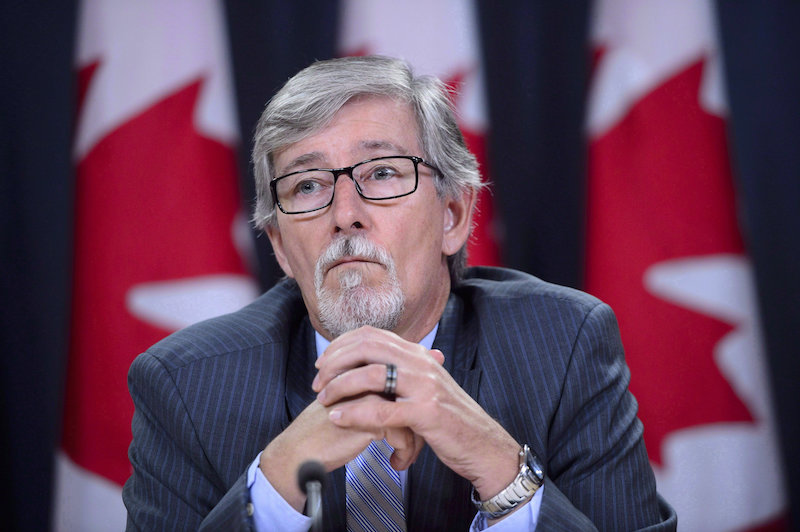[Editor’s note: This is an abridged version of a story that first appeared in our pop-up election newsletter, The Run. Sign up here to get new issues sent directly to your inbox every Tuesday and Thursday until election day.]
There are several critical government-appointed officers called “commissioners” in Canada, whom we in news media often refer to with the generous shorthand “watchdog.”
Three of these (sometimes-esoteric) commissioners — of competition, privacy and information — have become especially important to Canadians during the pandemic, and they’ve been sounding loud alarms on the need for changes, including to their own powers and independence. I’ve had the opportunity to interview them as a reporter on regulatory and tech matters for The Tyee.
The watchdog nickname, however, can suggest more independence than these commissioners actually enjoy. Commissioners are appointed by prime ministers and sometimes situated within ministries that have conflicting interests to balance, as with the Competition Bureau commissioner, who must prosecute industry while he himself reports to the minister in charge of boosting industry.
Canadian political scientist Hugh McDowall Clokie aptly summarized the purpose of commissioners in Canadian history (and British history before it) way back in 1938.
While he referred primarily to Royal Commission members who head up one-off investigations in the essay, his observations can be applied to today’s parliamentary commissioners who can be used partly to “forestall public criticism or prevent anticipated political pressure” and “postpone as long as possible the consideration of a question distasteful to the government” and “pacify some politically powerful section of the public.”
Clokie’s century-old observations ring true for our term-appointed commissioners, created by later acts of Parliament. Investigations today can be initiated by them as a release valve during moments of high public tension, and quietly closed years later when the public has moved on to other scandals, and governments have often changed.
Once an investigation begins, questions are often no longer allowed, and ETAs are not given.
But our commissioners clearly have a critical function. They provide the public with reports at the ends of investigations (unfortunately, only filed when they choose) and their annual reports can contain insightful information, though sadly mostly non-binding recommendations for governments.
Let’s take a look at these commissioners, their rallying cries of late, and who among the parties, if anyone, is listening to their demands.
The information commissioner
The frustration with Canada’s Access to Information system is way past its boiling point. The years-long waits or lack of response to requests are so common, and have been for so long, that they are seriously interfering with the work of journalists, academics and politicians filing them.
The commissioner in charge with reviewing federal access request complaints, Caroline Maynard, is a long-time government, police and military affiliated lawyer, who like most of her commissioner counterparts will rely on the good favour of the government of the day for reappointment.
But she is using atypically strong words to describe the state of the information access backlogs in Canada. Things were “critical,” Maynard said in a Tyee interview at the outset of the pandemic. And she wrote in 2020 that Canadians’ trust in their government would soon be “beyond repair” if not fixed soon. (Spoiler: it wasn’t.)
The government under the Liberals began a formal review of our access to information system last year. However, like commissions and commissioner investigations, the review will stretch a year and a half (and an election) past its launch, and its recommendations in 2022 will be non-binding.
The Conservatives also call for a “long-overdue” review of the Access to Information Act and promise to give the information commissioner the ability to make orders to release information “promptly,” which presumably means that deadlines would be enforced and the extra delay periods the Liberals built into ordering powers would be removed.
The NDP did not mention access to information in its platform. But Leader Jagmeet Singh said that transparency is “incredibly important” and that it’s been “difficult to obtain information,” which is something his party “absolutely believes in.”
The Greens, who addressed ATIP by far the most of any of the parties in their 2019 platform, have reduced any mention in their newly released 2021 platform to a single line.
They say they will expand the access to include “the Prime Minister’s Office, minister’s offices, and administration of Parliament.”
Gone are radical promises to scrap all access fees except the $5 filing charge, enforce legal deadlines (right now there is no consequence except a note in annual reports), override all ATIP exemptions (allowances in the act that allow third parties and government to refuse to release some information) and ensure cabinet confidences can be viewed by the information commissioner.
(Currently, a government official needs only cry “cabinet confidence,” and documents are out of Maynard’s reach, too.)
Liberals, to their credit, put in place one of the Greens’ previous promises, giving Maynard legal power to order departments to produce documents, and the ability to publish reports on her complaint reviews at her discretion.
The privacy commissioner
Daniel Therrien was appointed as privacy commissioner in 2014 by then prime minister Stephen Harper, despite NDP objections because he was “too close to government.”
Therrien was another career government lawyer for correctional services, immigration, public safety and defence, which made him a poor choice to investigate these same departments, according to some critics. But Trudeau approved of Therrien, and just renewed his appointment at the end of his first seven-year term.
But perhaps tellingly, Therrien was renewed for only one year instead of the maximum additional seven, putting the important position in the hands of whoever forms government next.
Therrien did deliver quite a strong rebuke of the Liberal government’s draft Bill C-11, which would reform legislation related to privacy and introduce two new bills to address online privacy concerns.
He objected to added steps to processes that would reduce his office’s power to impose penalties in a timely manner, estimating that the average complaint would take seven years to resolve under the new rules. He also objected to too-simple definitions of privacy consent that would let companies off the hook.
Overall, Therrien said, the Liberals’ flagship privacy bill was a “step backward” that would put Canada further behind other jurisdictions we already trail in privacy legislation.
The NDP promises to introduce its own bill of privacy rights and boost “the power of the privacy commissioner to make and enforce orders and levy fines and penalties” — direct references to Therrien’s complaints about C-11.
The Liberal platform only mentions the measures already proposed in C-11, which Therrien may or may not still be around to see revived and revised.
The Conservatives say in their platform only that they will pass legislation that will protect privacy “more effectively” than the “weak” Bill C-11.
The competition commissioner
Anti-trust and competition were big topics in the recent U.S. election, where speculation was high on the two parties’ possible plans for breaking up big tech.
But Canada’s laws have been largely designed to enable consolidation, as previous competition commissioner John Pecman told The Tyee in a post-exit interview.
More than ever, Canadians are feeling the dominance of “big three” players in many industries — like Rogers, Shaw and Telus in telecommunication. This is especially as people and small businesses continue to look online for safe ways to work, play and shop during COVID.
Current Competition Bureau commissioner Matthew Boswell, who prosecuted financial fraud at the Ontario Securities Commission and as a Crown prosecutor before his appointment by Trudeau, has called for a comprehensive review of the Competition Act — an idea that the Conservative party alludes to in its platform.
What Boswell can’t say, and Pecman only felt comfortable saying on his way out the door is the biggest issue of all — their boss. The Competition Bureau, which is supposed to prosecute corporations, is situated beneath the ministry of industry, the most lobbied in Canada by corporations. The commissioner reports to the ministry’s deputy minister.
And a law that allows mergers to happen as long as they show some efficiency gains for the corporations — the so-called “efficiencies defence” — remains on the books, which halts many potential actions by Boswell’s bureau before they can even begin.
These widely publicized shortcomings, which makes Canada something of a curiosity or joke for the world in anti-trust, are not addressed explicitly in any political platform.
The Liberals deserve some credit on this file for boosting the Competition Bureau’s budget by $96 million — nearly a third — in coming years. It’s a move that has been widely called for by critics.
The Conservative party, the traditional champion of markets to solve problems, is the only party that makes any reference at all to competition law in its platform — and it is mentioned plenty. All other parties miss out on this populist easy win to go after corporate concentration.
But some Tory promises are vague, already in place or suggest they would interfere with the independent law enforcement agency in ways they can’t, such as promises to reject mergers or order the bureau to investigate specific things like bank fees.
They do however call for a “code of conduct” in the highly concentrated grocery industry to protect suppliers and competition from being squeezed (a suggestion called for by Boswell and predecessors).
So as is typical, the current opposition parties are the most aligned with what our so-called government watchdogs want from the next government.
The Liberals have made small strides in alignment with the commissioners on each file, too, and their budgets show promises they didn’t see worth including in their platform summary.
However, if the full overhauls and details demanded by our commissioners are to make it into the next government’s plans or party promises, they will have to show up in the remaining days of our surprise election campaign.
THE RUNDOWN
Additional readings reeled in from around the web.Throwback Thursday: Canada’s Library of Parliament runs down the history of various commissioner and similar officer roles, how they came to be, how they are appointed, and who they report to. And an insightful paper dating to the 1960s demonstrates how far back Canada’s love of commissions, inquiries and reviews stretches.
Is the Competition Bureau’s budget enough?: The Vancouver Sun wondered in May whether the recent budget increase given to the Competition Bureau is enough to make it effective. The Sun is published by Postmedia, which itself was the subject of a bureau investigation that was dropped before it reached the court. An opinion piece by two academics in the Globe and Mail answers the Sun’s question with a “definitely not.”
What the public has to say: Jim Bronskill of the Canadian Press looked at some of the submissions to the government’s ongoing review of access to information in Canada. ![]()
Read more: Rights + Justice, Election 2021, Science + Tech, The Run
















Tyee Commenting Guidelines
Comments that violate guidelines risk being deleted, and violations may result in a temporary or permanent user ban. Maintain the spirit of good conversation to stay in the discussion.
*Please note The Tyee is not a forum for spreading misinformation about COVID-19, denying its existence or minimizing its risk to public health.
Do:
Do not: